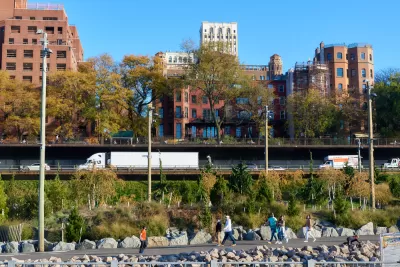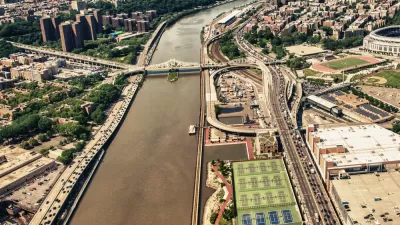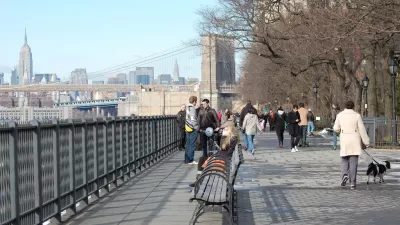Supporters of the waterfront park worry NYCDOT’s plan to potentially widen the Brooklyn-Queens Expressway could reduce green space in “one of the most expensive urban parks ever built.”

If the New York City Department of Transportation goes ahead with a proposal to expand the Brooklyn-Queens Expressway, known locally as the BQE, to three lanes in each direction, the road could cut into green space now part of the Brooklyn Bridge Park, reports Kevin Duggan for Streetsblog NYC.
The park, an 85-acre space completed between 2010 and 2021, is “one of the most expensive urban parks ever built” at $400 million. Former Traffic Commissioner San Schwartz and former Transportation Commissioner Hank Gutman both made public comments signaling their concern for the park and how an expanded highway footprint would damage the green space created by it.
DOT’s plans aren’t entirely clear, Duggan writes. While “DOT’s conceptual renderings of a future highway do indeed show substantial new open spaces covering the roadways and sloping down to Brooklyn Bridge Park,” the renderings show a 40-foot-wide highway, which would only accommodate two lanes in each direction. Yet in a December statement, DOT said the agency anticipates that their analysis “will result in three lanes of traffic.”
An analysis conducted by Schwartz’s firm three years ago “found the roadway could work with just two lanes if officials tried to discourage driving by closing some ramps or limiting them to high-occupancy vehicles, or by charging to cross the East River bridges at the same rates as the tolled Hugh Carey Tunnel.” A spokesperson for the park says “park officials had been assured the repairs would not reduce green space.”
FULL STORY: Wider BQE Could Be ‘Intrusion’ on Brooklyn Bridge Park, Ex-Transportation Leaders Warn

Planetizen Federal Action Tracker
A weekly monitor of how Trump’s orders and actions are impacting planners and planning in America.

Congressman Proposes Bill to Rename DC Metro “Trump Train”
The Make Autorail Great Again Act would withhold federal funding to the system until the Washington Metropolitan Area Transit Authority (WMATA), rebrands as the Washington Metropolitan Authority for Greater Access (WMAGA).

The Simple Legislative Tool Transforming Vacant Downtowns
In California, Michigan and Georgia, an easy win is bringing dollars — and delight — back to city centers.

The States Losing Rural Delivery Rooms at an Alarming Pace
In some states, as few as 9% of rural hospitals still deliver babies. As a result, rising pre-term births, no adequate pre-term care and "harrowing" close calls are a growing reality.

The Small South Asian Republic Going all in on EVs
Thanks to one simple policy change less than five years ago, 65% of new cars in this Himalayan country are now electric.

DC Backpedals on Bike Lane Protection, Swaps Barriers for Paint
Citing aesthetic concerns, the city is removing the concrete barriers and flexposts that once separated Arizona Avenue cyclists from motor vehicles.
Urban Design for Planners 1: Software Tools
This six-course series explores essential urban design concepts using open source software and equips planners with the tools they need to participate fully in the urban design process.
Planning for Universal Design
Learn the tools for implementing Universal Design in planning regulations.
Smith Gee Studio
City of Charlotte
City of Camden Redevelopment Agency
City of Astoria
Transportation Research & Education Center (TREC) at Portland State University
US High Speed Rail Association
City of Camden Redevelopment Agency
Municipality of Princeton (NJ)





























